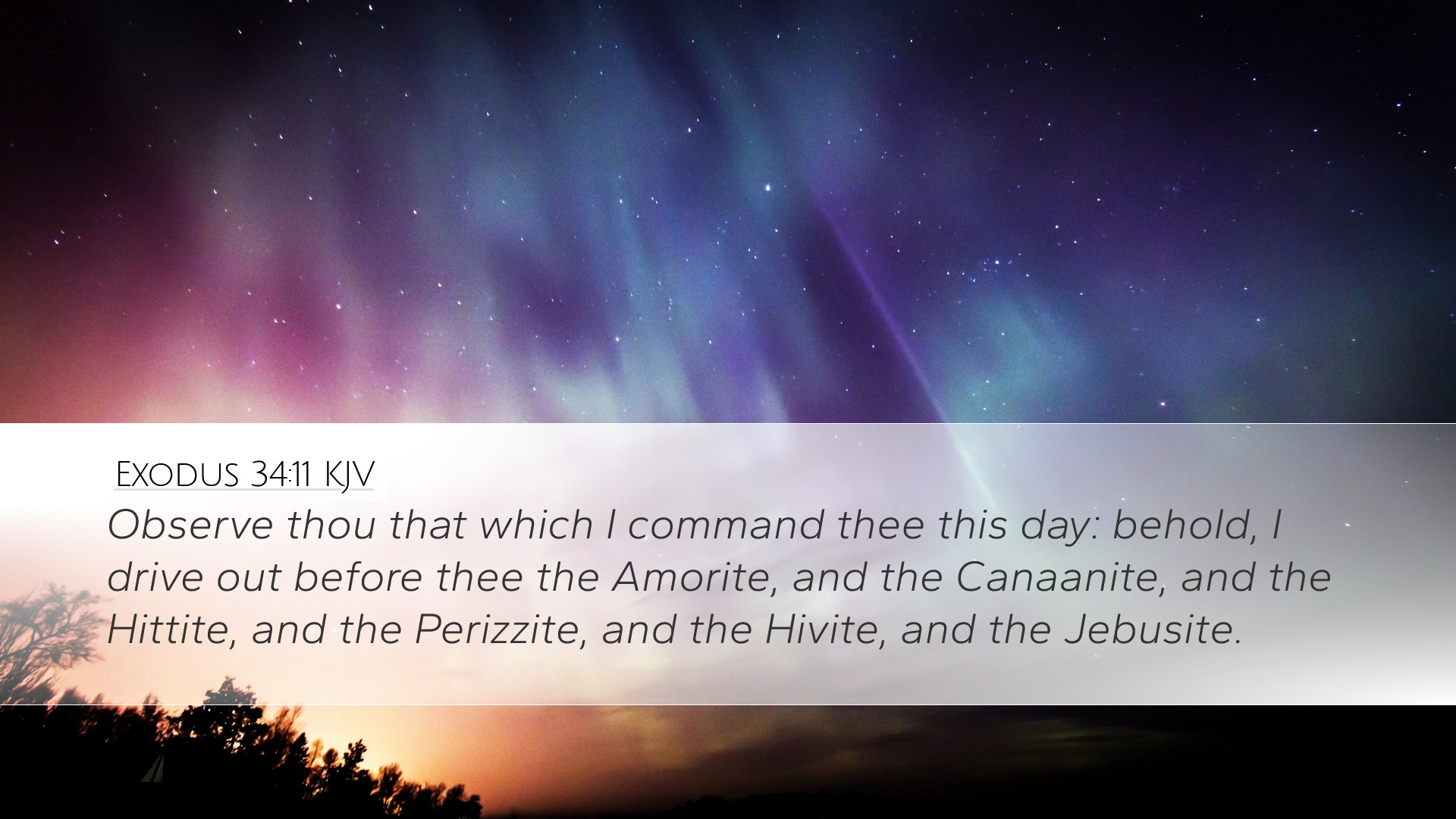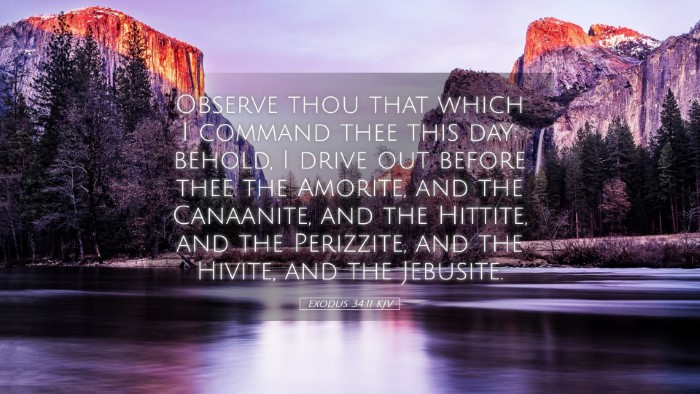Exodus 34:11 - Commentary Summary
Verse: "Observe thou that which I command thee this day: Behold, I drive out before thee the Amorite, and the Canaanite, and the Hittite, and the Perizzite, and the Hivite, and the Jebusite."
Introduction
This verse marks a pivotal moment in the covenant renewal between God and Israel, emphasizing God's commitment to lead and protect His people as they advance into the Promised Land. The command to observe His statutes sets a foundational principle for Israel’s covenantal relationship with God.
Exegesis
God's directive, "Observe thou that which I command," serves as a solemn charge to Israel, indicating that obedience is paramount in receiving God's promises. The emphasis on observance highlights the requirements of covenant loyalty.
Divine Promise and Assurance
By stating, "I drive out before thee," God expresses His sovereign power and commitment. The mention of various nations such as the Amorites, Canaanites, Hittites, Perizzites, Hivites, and Jebusites illustrates the obstacles that stood in Israel’s path, representing both spiritual and physical challenges.
The Nations Identified
- Amorites: Often associated with sin and rebellion, the Amorites represent opposition to God’s will.
- Canaanites: Their presence signifies the temptations that could lead Israel away from faithfulness.
- Hittites: Known for their military strength, they symbolize the physical threats Israel would face.
- Perizzites: They exemplify the entanglements of local culture and idolatry that could lure Israel from the path of righteousness.
- Hivites: Representing deceitful alliances, the Hivites remind Israel of the necessity of discernment.
- Jebusites: As inhabitants of Jerusalem, they are emblematic of the ultimate conquest that represents God's final victory over sin.
Theological Insights
This verse encapsulates crucial theological themes relevant to pastors, students, and theologians.
1. Covenant Faithfulness
God's insistence on observance reflects a foundational aspect of the covenant—faithfulness. Matthew Henry stresses that observing God's command leads to the fulfillment of His promises, emphasizing that Israel's success hinges on their allegiance to God.
2. Divine Sovereignty
God's promise to drive out the nations underscores His sovereignty over history and nature. Adam Clarke notes that while the Israelites would engage in battle, it is ultimately God who secures victory, signifying that human effort must be undergirded by divine intervention.
3. Preparation for Possession
This passage highlights the importance of spiritual preparation. Albert Barnes enjoins that preparation for possessing the land involves both physical readiness for battle and spiritual fidelity. The clearance of the land serves as a metaphor for the need to purge sin from one’s life.
4. The Nature of Spiritual Warfare
The mention of the various tribes symbolizes the multifaceted nature of the spiritual struggles believers face today. Each tribe represents specific challenges: moral compromise, idolatry, cultural distractions, and spiritual blindness. Believers are called to be vigilant and discerning.
Practical Application
For pastoral care and Christian leadership, this verse serves as a reminder of the importance of teaching obedience to God’s commandments. Churches must encourage believers to engage in the spiritual battles they encounter in their lives by equipping them with the Word of God.
1. Encouragement in Obedience
Pastors can draw from this text to inspire congregations to commit to God’s ways, reinforcing that obedience is the pathway to experiencing His blessings.
2. Understanding Spiritual Authority
Christians are reminded of their position in Christ, where authority is established not by personal strength but through solidarity with God’s commands.
3. Discernment in Conflict
As they navigate personal and communal challenges, believers should seek wisdom in their engagement with contemporary issues reflecting the giants in their lives.
Conclusion
Exodus 34:11 is not merely an ancient command but a timeless directive challenging God’s people to trust in His promises, engage in covenant fidelity, and rely on divine power to overcome challenges. The theological depth and practical applications of this verse remain relevant for today’s believers, reminding them of God's faithfulness, the seriousness of their commitment, and the transformative power of obedience.


